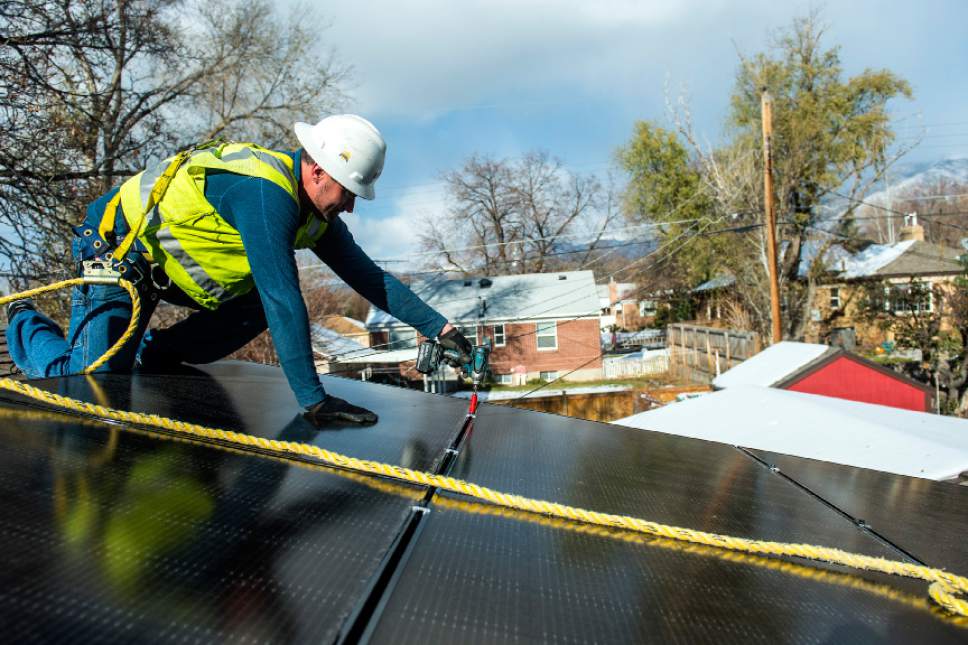This is an archived article that was published on sltrib.com in 2016, and information in the article may be outdated. It is provided only for personal research purposes and may not be reprinted.
Utah's rooftop solar industry will have more time to negotiate net-metering bills with the state's main utility, which pushed pause on a review of its controversial price-change proposal Friday afternoon.
The state Public Service Commission suspended consideration of the Rocky Mountain Power's request to create a new rate schedule for residential customers just before the close of business Friday after the utility asked for more time to negotiate with solar energy advocates.
According to a letter Rocky Mountain Power submitted to the commission, the utility has spent the past week talking to various stakeholders about negotiating.
"Based on the current status of the meetings and in an effort to foster further discussion," the letter says, Rocky Mountain Power recommended a suspension "while interested stakeholders continue to seek mutually acceptable resolutions."
The suspension will remain in place until Rocky Mountain Power indicates to the Public Service Commission that a resolution has been reached, or that negotiations have become "unfruitful," according to the commissioners' Friday afternoon order.
Doug Robinson, CEO of Legacy Power, said he was excited by the outcome.
"I'm really relieved that the Public Service Commission … wants to see mutually acceptable resolutions," he said. "This is really what the solar industry has been asking for."
Ryan Evans, president of the Utah Solar Energy Association, agreed. He said he hoped negotiations would allow the solar industry to review additional data with Rocky Mountain Power that demonstrate the benefits, not just the cost, of rooftop solar to the electrical utility.
"There's a way to find something that will work for everyone," he said, "and that's what we hope to do."
Rocky Mountain Power spokesman Paul Murphy said the company also believes a mutually acceptable agreement is possible, though it still feels changes to electrical bills are necessary.
Solar users purchase significantly less power than households without rooftop solar, which lets them avoid paying for grid maintenance — currently part of charges for electrical use — and thus receive what amounts to a subsidy from other customers, according to Rocky Mountain Power.
"Our goal is still the same," Murphy said. "We want a rate that is fair to rooftop solar customers, and one that does not hurt customers who don't have solar panels."
Murphy said Gov. Gary Herbert arranged a meeting earlier this week between the utility and various solar energy advocates to discuss whether the parties could work together to find common ground.
It was not the first time Rocky Mountain Power was involved in such talks, Murphy said, "but sometimes it's good to try it one more time."
The new rate schedule was set to automatically take effect at the close of business Friday, barring intervention by the Public Service Commission. This request, which is the first step in Rocky Mountain Power's larger proposal to change the way electrical bills are calculated for Utahns with rooftop solar arrays, lays the groundwork for grandfathering current net-metering customers into the old rate structure.
Had the request gone into effect Friday, residents who filed net metering requests after Dec. 9 would have been assigned to the new rate schedule. Their bills would have remained the same at first, but Rocky Mountain Power has filed a proposal that would increase these customers' base charge, decrease the price they pay per kilowatt hour of electricity, and introduce a monthly "demand charge."
(To see how the proposed changes affect solar bills, visit local.sltrib.com/solar.)
The proposed rate change is set for a hearing before the Public Service Commission in August. Friday's order does not affect that schedule.
Anxiety over the possibility of substantial cost increases — Rocky Mountain Power has said that the new rates would increase the average net-metering customer's monthly bill from $55 to $74 — has prompted thousands of Utahns to sign up for the utility's rooftop solar program.
The company received 2,000 applications in November and since Dec. 1 has already collected another 2,300 applications. During the summer and early fall, the company averaged 1,300 applications a month.
Now, while Rocky Mountain Power works to negotiate with solar stakeholders, it'll also be carving out time to address the piles of paperwork.
Customers who install rooftop arrays can't hook them up to Rocky Mountain Power's electrical grid until their application is approved.
"We will be working as expeditiously as possible," Murphy said. "But this is an extraordinary number of applications."
Twitter: @EmaPen



